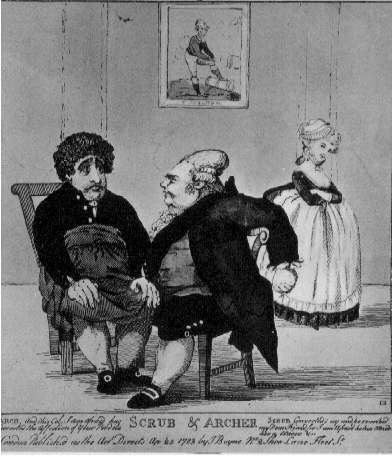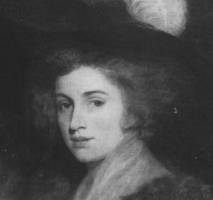


| [ Previous ] [ Next ] |

|

|
A powerful voice within the Whig party in England from the period of the Revolution through to the end of the 18th century, Charles James Fox was the epitome of a rake of his time and is often remembered as much for his gambling, drinking and pursuit of women as for his politics. This, naturally, made him irresistible to Ban Tarleton, who gravitated to his political circle after the end of the war and remained in it loyally through the 1790s, when many others deserted the failing Whig party. The two men also had a connection through Mary Robinson, who was Fox's lover for a time in 1782, and seems to have drifted back and forth between them before she and Fox went opposite ways. (Their sexual liaison is sometimes denied by Fox's biographers, but was certainly accepted as a reality by his friends, judging by various bits of correspondence.)
Son of Lord Holland and a daughter of the Duke of Richmond, Fox began his political career as a Tory, but between 1772 and 1774, his personal dislike of George III and radical notions pushed him gradually towards the Whigs. He spent most of his active political career in opposition, gaining fame as one of the finest orators of the age. However, he was too fond of a private life dominated by self-indulgence, and too lacking in professional ambition, to be a successful politician.
As with many radicals, his political views were marked by forward-looking ideals but marred by a lack of practicality. Additionally, his public life was subject to wildly emotional highs and lows which sometimes led him to resign power in a snit, then seek to regain it again on a changing whim. Through the course of his career, he served the Ministry as a Lord of the Admiralty, changed parties, spoke out in favor of the American colonies from an opposition bench (apparently going so far as to throw parties in celebration of their victories), fleetingly formed a surprise coalition with Lord North (who had served as Prime Minister throughout the Revolution, and whom Fox had previously opposed loudly and at length), and spent years in single-minded and personal opposition to Pitt the Younger. His periods of real power were few, and he left his mark on late-18th century politics for the brilliance of his way with words far more than for tangible accomplishments. One of his recent biographers postulates that in the last year or so of his life, when Fox finally achieved a position of power within the Ministry, he came to the realization that his long-term hatred of George III (whom he considered a would-be despot) was unjustified, not to mention discovering that finding fault with the government from opposition was a considerably easier task than actually governing.
Short and heavy, Fox was a noted dandy in his youth but became infamous in mid-life for his slovenliness. With heavy brows and perpetual stubble, he was natural fodder for caricaturists, and received dozens (if not hundreds) of pen-and-ink jabs, such as this one based on Farquharson's Beaux Stratagem, which jibes at him over the loss of Mary to Tarleton. (It's questionable whether Fox's split from Mary had anything to do with Tarleton, but the timing made it an obvious conclusion for observers.) Fox (left) is Scrub with Lord North as Archer. Mary becomes Gipsey, the lady's maid. A painting of Ban, based on the Reynolds, is on the wall behind them. The dialogue is,
ARCHER to SCRUB: "And this colonel I am afraid has converted the affection of your Perdita."
SCRUB to ARCHER: "Converted, ay, and perverted, my dear friend, for I am afraid he has made her a Whore!"

|
Fox also appears in several of the cartoons I have posted for Hanger, Rawdon and Mary Robinson.
Soon after the end of his affair with Mary, Fox settled into a liaison with "Mrs." Elizabeth Bridget Armstead (or Armistead). Mrs. Armstead was another high-profile courtesan and like Mary she was actively involved with Whig politics. (Also like Mary, she had been briefly mistress to the Prince of Wales.) There is a story (which seems to have originated in a political pamphlet published after the 1788 election) that Mrs. Armstead met Fox while she was working as Mary's maid servant, but since she was already enlivening the gossip columns as the mistress of Lord George Cavendish while Mary was having her fling with the Prince of Wales, this seems questionable.1
 Mrs. Armstead by Reynolds |
Unusually for the era, her relationship with Fox evolved from a business arrangement to a love affair and in 1795, after several years of living together, they secretly married. Fox finally revealed the legality of the connection in 1802, which resulted in the anticipated scandal. Living openly with his mistress was bad enough. Marrying a woman (apparently of Cockney origins, no less) with whom he'd been living was judged by the prim and proper to be even worse. Unruffled by the opinions of others, the couple contentedly lived out the few remaining years of Fox's life.
Fox died of dropsy at a relatively young age, but his Liz survived him by many years. While opinions on his achievements, his intentions, and even his sanity, remain divided, his brilliance as a public speaker and his charisma, which attracted and held numerous friends, are universally granted.
Biographies of Fox and studies of his political career abound, including:
| [ Index ] | [ Previous ] [ Next ] |
1 The two spellings of Mrs. Fox's name are used with about equal frequency in later documents. "Armstead" seems somewhat more common contemporarily. Consensus seems to be that there never was a Mr. Armstead, though neither his existence nor his nonexistence can be documented. The story that Lizzie started out as Mary Robinson's maid is discussed in Walter Sichel, Sheridan, 2 vols. (London: Constable & Company Ltd., 1909), 2:62 and n. Sichel states that "the long and illustrated Westminster Election, published in the next year [i.e. 1789], expressly says that she was Mrs. Robinson's [lady's-maid]." [ back ]
| Return to the Main Page | Last updated by the Webmaster on January 30, 2004 |